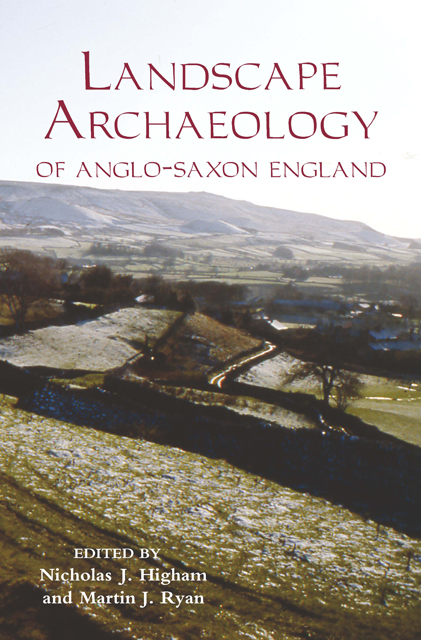Book contents
- Frontmatter
- Contents
- List of Illustrations
- Contributors
- Acknowledgements
- Abbreviations
- 1 The Landscape Archaeology of Anglo-Saxon England: An Introduction
- 2 Barriers to Knowledge: Coppicing and Landscape Usage in the Anglo-Saxon Economy
- 3 Landscape Change during the ‘Long Eighth Century’ in Southern England
- 4 Population Ecology and Multiple Estate Formation: The Evidence from Eastern Kent
- 5 Exploring Black Holes: Recent Investigations in Currently Occupied Rural Settlements in Eastern England
- 6 Medieval Field Systems and Settlement Nucleation: Common or Separate Origins?
- 7 The Environmental Contexts of Anglo-Saxon Settlement
- 8 Calendar Illustration in Anglo-Saxon England: Realities and Fictions of the Anglo-Saxon Landscape
- 9 The Anglo-Saxon Plough: A Detail of the Wheels
- 10 ‘In the Sweat of thy Brow Shalt thou eat Bread’: Cereals and Cereal Production in the Anglo-Saxon Landscape
- 11 The Early Christian Landscape of East Anglia
- 12 The Landscape and Economy of the Anglo-Saxon Coast: New Archaeological Evidence
- Index
1 - The Landscape Archaeology of Anglo-Saxon England: An Introduction
Published online by Cambridge University Press: 16 February 2023
- Frontmatter
- Contents
- List of Illustrations
- Contributors
- Acknowledgements
- Abbreviations
- 1 The Landscape Archaeology of Anglo-Saxon England: An Introduction
- 2 Barriers to Knowledge: Coppicing and Landscape Usage in the Anglo-Saxon Economy
- 3 Landscape Change during the ‘Long Eighth Century’ in Southern England
- 4 Population Ecology and Multiple Estate Formation: The Evidence from Eastern Kent
- 5 Exploring Black Holes: Recent Investigations in Currently Occupied Rural Settlements in Eastern England
- 6 Medieval Field Systems and Settlement Nucleation: Common or Separate Origins?
- 7 The Environmental Contexts of Anglo-Saxon Settlement
- 8 Calendar Illustration in Anglo-Saxon England: Realities and Fictions of the Anglo-Saxon Landscape
- 9 The Anglo-Saxon Plough: A Detail of the Wheels
- 10 ‘In the Sweat of thy Brow Shalt thou eat Bread’: Cereals and Cereal Production in the Anglo-Saxon Landscape
- 11 The Early Christian Landscape of East Anglia
- 12 The Landscape and Economy of the Anglo-Saxon Coast: New Archaeological Evidence
- Index
Summary
This volume is one of a pair to emerge from a conference on the Landscape of Anglo-Saxon England hosted in 2007 by the Manchester Centre for Anglo-Saxon Studies (MANCASS) at the University of Manchester. It features exploration of the Anglo-Saxon landscape primarily via archaeological and/or art historical methodologies, leaving those approaches which are more specifically text and/or place-name based for the companion volume. Naturally, this collection incorporates a wide spectrum of papers of different lengths and types, some dealing with quite specific issues or categories of data but some with major research questions and/or periods. Of course, it does not pretend to cover all aspects of the landscape of Anglo-Saxon England but it is hoped that it will mark a new stage in the development of our understanding, open up a series of research questions to wider discussion and provide a useful platform from which researchers will take the whole subject forward.
It is probably fair to say that more landscape archaeologists would see themselves as medievalists than either Romanists or prehistorians, but many have tended to focus primarily on the later Middle Ages, from c.1000 to the early sixteenth century. While there are several works of book length on the Roman landscape, and then the later medieval, there are remarkably few focusing exclusively on the Anglo-Saxon landscape. Although, by their very nature, projects researching landscape archaeology tend to be multi-period in design, there is a tendency for the Anglo-Saxon period to be viewed either as the end- point at which to close a project centred on the prehistoric and/or Roman landscape, or as an introduction to questions centred in the medieval.
Yet, conversely, the ‘long Anglo-Saxon period’ – from say 450 to 1100 – has long been seen as central to the ways in which we write the landscape history of England. A century ago, scholars believed it was the Anglo-Saxons who felled much of the wildwood and introduced the habit of living in villages – over and against the more scattered farmsteads of the pre-existing Celts (who had in any case mostly fled or been exterminated). Likewise, they believed that the Anglo-Saxons brought with them the ploughing of intermingled strips within shared fields, replacing pre-existing, much squarer ‘Celtic fields’.
- Type
- Chapter
- Information
- The Landscape Archaeology of Anglo-Saxon England , pp. 1 - 22Publisher: Boydell & BrewerPrint publication year: 2010



